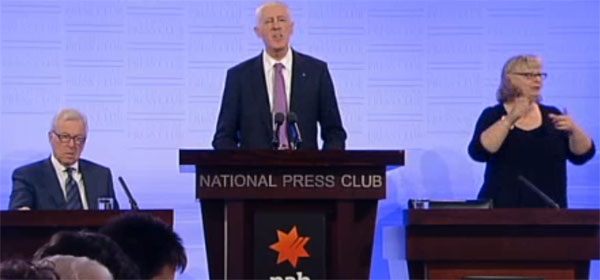In a passionate and at times emotional address to the National Press Club, outgoing Disability Discrimination Commissioner Graeme Innes has challenged Prime Minister Tony Abbott to develop a disability jobs scheme, while criticising the government’s rhetoric about the nation becoming one of “lifters not leaners”.
Innes, who will retire from his role at the Australian Human Rights Commission this week, praised Assistant Minister for Social Services Mitch Fifield for “sailing the good ship NDIS through some pretty troubled waters” but criticised the government for letting the proportion of its employees with a disability fall.
“In the mid 1990s, 5.8 per cent of the Commonwealth government workforce were people with disabilities, but by 2005 that had fallen to 3.8 per cent,” he said.
Innes said that while the government was spending money to help move people with a disability into the workforce, efforts would only be successful if those people and industry were put at the centre of the process.
He told the Press Club businesses need to be offered greater incentives to hire staff with disabilities and should be encouraged by the government to set and fulfil employment quotas.
Reflecting on the improvements that have been made to the rights and opportunities of those living with disabilities in Australia in recent decades, Innes also noted that discrimination and disadvantage persisted.
“Forty-five per cent of us live in poverty, last among OECD countries,” he said, later adding that violence against women with disabilities remained a particular concern.
Innes, who is legally blind, used stories from his personal experiences and time as a Commissioner to challenge the idea that Australians could be neatly labeled as either learners or lifters.
“I have never accepted the concept of ‘lifters’ and ‘leaners’, a Ming dynasty phrase which has lately gained currency,” Innes said.
“It's such a facile concept. And we all move from one role to the other dozens of times a day.
“When I walk down the street with [my wife]Maureen — and I have to say which ever street that is I couldn't be happier — I'm a leaner.
“I'm gaining guidance from her by holding her arm. But when that guidance stops, and at the end of a long hard day for her, I put my arm around her in a supportive cuddle, I become a lifter.”
Innes also reinforced his opposition to suggestions made in a report on Australia’s welfare system that people who are not permanently unable to work should be moved off the disability support pension.
“Changes proposed just last weekend will place people with episodic disabilities on a different — probably lower — allowance, but there is still no effective jobs plan,” he said.
“Again, we are blocked from being lifters.”

After cuts to the AHRC’s budget it May, it was announced that the Disability Discrimination Commissioner role held by Innes since 2005 would no longer continue as a stand-alone position, with the work to be shared among other commissioners.
Age Discrimination Commissioner Susan Ryan will take over Innes’ role part-time.
Innes himself will move on to take a position as chair of the board at the Attitude Foundation, which seeks to raise $200,000 to run campaigns using television and film to change public attitudes towards people with disabilities.
At the heart of Innes’ remarks was a call for autonomy and empowerment of people with disabilities.
“We see retail chains who think its ok to sell t-shirts with "retard" across the front, when "n*gger" or "slut" would not pass muster,” he said.
“Such language diminishes us, and we are viewed as either victims or heroes, when we should be viewed as agents of our own destiny.”
Innes also appeared to take a shot at fellow Commissioner Tim Wilson, who has championed the Attorney-General’s proposed changes to the Racial Discrimination Act since being parachuted into the AHRC after the Coalition’s election victory last year.
“I still have the passion and the stomach to advocate for the rights of people with disabilities and I will continue to do so in other roles,” Innes said.
“What I don't have is the stomach to advocate for the rights of bigots, so perhaps its time for me to move on.”
In his closing, Innes urged people to continue down a path of equality for people with disabilities.
“The position of people with disabilities has improved significantly in Australia in the last few decades. There is still, to quote then NSW Premier Morris Iemma, more to do but heading in the right direction,” Innes said.
“On the upside there has been significant progress in making transport and buildings more accessible. On the downside as a community we are failing at finding jobs and delivering equal justice for people with disabilities.
“As I leave this role I urge government, the community and the disability sector to commit to more jobs, more equal justice and a community attitude which celebrates and enhances the contribution of people with disabilities.
“Quality of life for Australians with disabilities will continue to improve, and one day we will have another full-time disability discrimination commissioner with lived experience of disability.
“In the meantime, I’ll follow the dictum of that great human rights advocate, Dr Seuss. Don’t cry that it’s over, smile that it happened.”
* The ABC has broadcast the entire speech on its website. You can watch it here.
Donate To New Matilda
New Matilda is a small, independent media outlet. We survive through reader contributions, and never losing a lawsuit. If you got something from this article, giving something back helps us to continue speaking truth to power. Every little bit counts.



